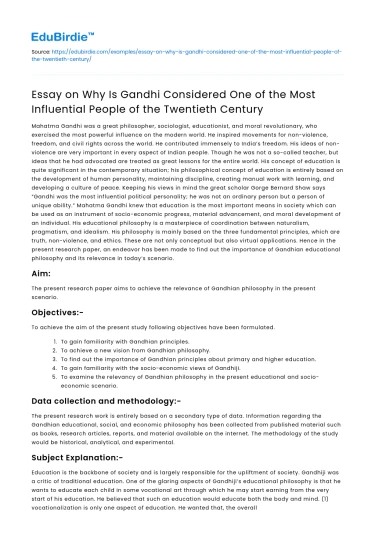Mahatma Gandhi was a great philosopher, sociologist, educationist, and moral revolutionary, who exercised the most powerful influence on the modern world. He inspired movements for non-violence, freedom, and civil rights across the world. He contributed immensely to India’s freedom. His ideas of non-violence are very important in every aspect of Indian people. Though he was not a so-called teacher, but ideas that he had advocated are treated as great lessons for the entire world. His concept of education is quite significant in the contemporary situation; his philosophical concept of education is entirely based on the development of human personality, maintaining discipline, creating manual work with learning, and developing a culture of peace. Keeping his views in mind the great scholar Gorge Bernard Shaw says “Gandhi was the most influential political personality; he was not an ordinary person but a person of unique ability.” Mahatma Gandhi knew that education is the most important means in society which can be used as an instrument of socio-economic progress, material advancement, and moral development of an individual. His educational philosophy is a masterpiece of coordination between naturalism, pragmatism, and idealism. His philosophy is mainly based on the three fundamental principles, which are truth, non-violence, and ethics. These are not only conceptual but also virtual applications. Hence in the present research paper, an endeavor has been made to find out the importance of Gandhian educational philosophy and its relevance in today’s scenario.
Aim:
The present research paper aims to achieve the relevance of Gandhian philosophy in the present scenario.
Save your time!
We can take care of your essay
- Proper editing and formatting
- Free revision, title page, and bibliography
- Flexible prices and money-back guarantee
Objectives:-
To achieve the aim of the present study following objectives have been formulated.
- To gain familiarity with Gandhian principles.
- To achieve a new vision from Gandhian philosophy.
- To find out the importance of Gandhian principles about primary and higher education.
- To gain familiarity with the socio-economic views of Gandhiji.
- To examine the relevancy of Gandhian philosophy in the present educational and socio-economic scenario.
Data collection and methodology:-
The present research work is entirely based on a secondary type of data. Information regarding the Gandhian educational, social, and economic philosophy has been collected from published material such as books, research articles, reports, and material available on the internet. The methodology of the study would be historical, analytical, and experimental.
Subject Explanation:-
Education is the backbone of society and is largely responsible for the upliftment of society. Gandhiji was a critic of traditional education. One of the glaring aspects of Gandhiji’s educational philosophy is that he wants to educate each child in some vocational art through which he may start earning from the very start of his education. He believed that such an education would educate both the body and mind. (1) vocationalization is only one aspect of education. He wanted that, the overall personality of the child should be developed through some productive work. A love for manual work should be injected into the mind of children. This is not a compulsion but the child will learn it by doing that work. Hence they can feel free from bookish knowledge. Therefore, schools do have not to be factories that produce the same type of product. The Gandhian concept of basic education aims at the all-round development of human personality. His primary emphasis is on the three ‘H’s i.e. Head, Heart, and Hand rather than on the three ‘R’s i.e. Reading, Writing, and Arithmetic. According to him, the true development of the head, heart, and soul is necessary for a satisfactory system of education. (2) True education is that which draws out and stimulates the spiritual, intellectual, and physical faculties. (3) He emphasized that the aim of education should be to build the whole man and develop his integral personality. It is simply the process of bringing out what is latent in man.
Earning while learning was the motto of Gandhian educational philosophy, this will increase the creativity of a student. As Gandhi wanted to make Indian villages self-sufficient he emphasized that vocational education should increase the efficiency of the students who would make the village a self-sufficient unit. Because real India is residing in villages today and the development of India entirely depends on the development of villages.
Gandhiji advocated for free and compulsory education for all boys and girls between seven to fourteen years of age. Education should be imparted at the primary level to the student’s mother. A free primary universal education is to be imparted to all the children in the village. This will make the backbone of a country strong. After independence, this principle was included in the Indian constitution in Article 21A which is known as the Right To Education Act. It indicates the relevance of the Gandhijis principle on education. Nowadays the education that is provided is just whitewashed which has mere use to students only for intellectual development. The worst part is that more emphasis is being given to infrastructural facilities, marks obtained by wards, and English medium. Hence there is a tremendous lack of respect of emotional and social development in students. The quality of education is deteriorating day by day. Hence, serious efforts in this direction are required by the government and this could be only possible if we follow the ideas of basic education of Gandhiji.






 Stuck on your essay?
Stuck on your essay?

